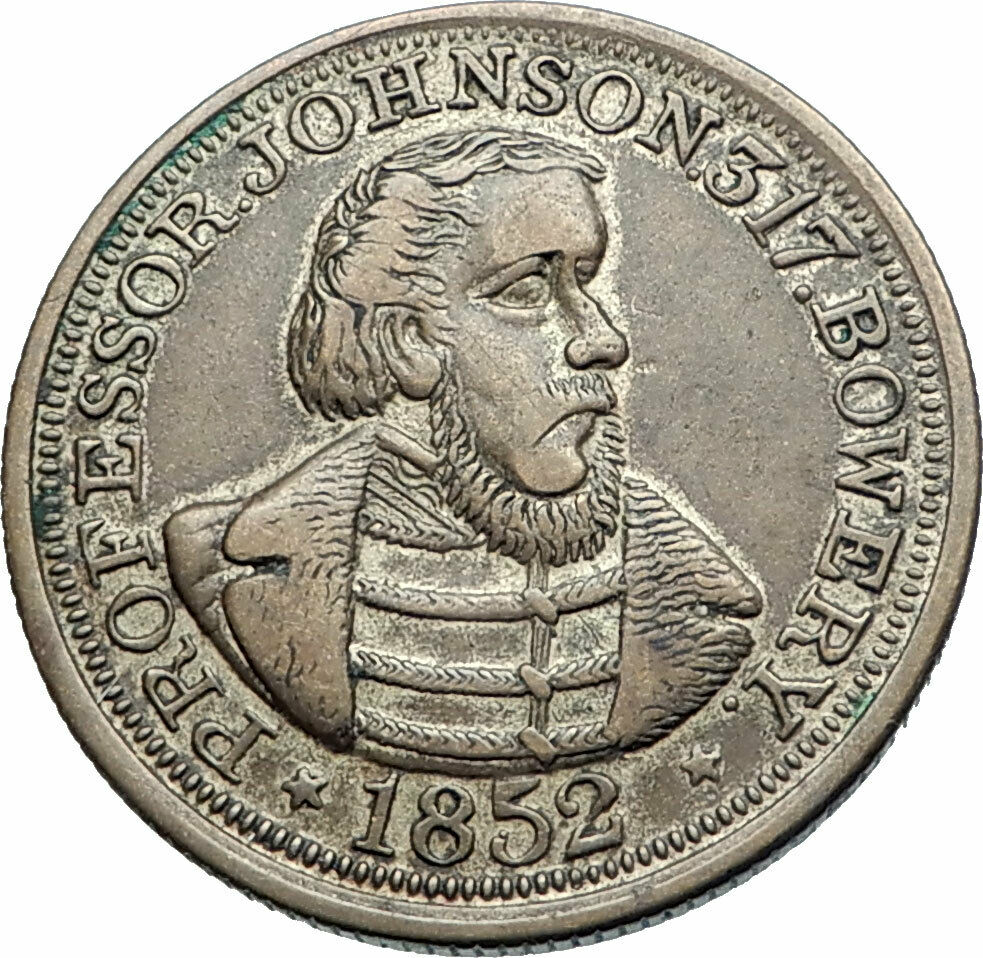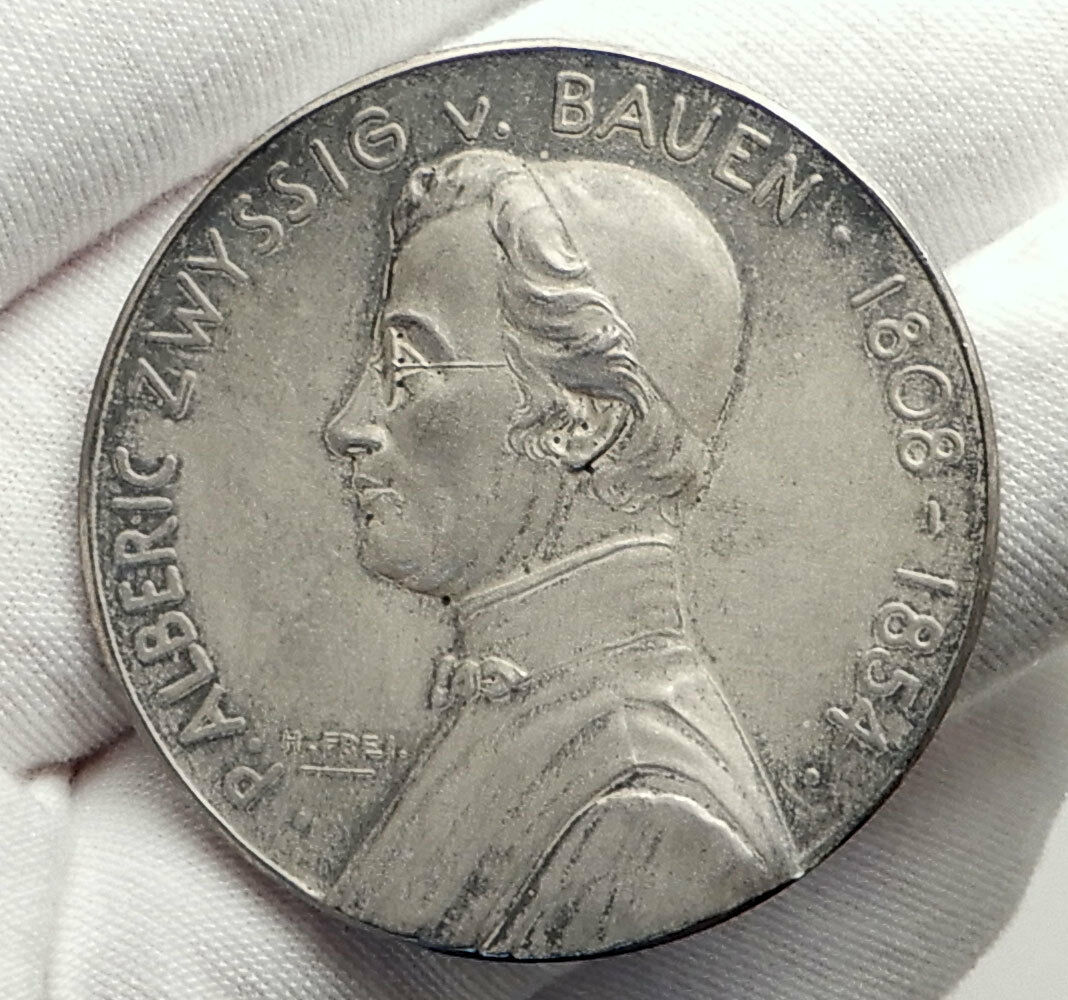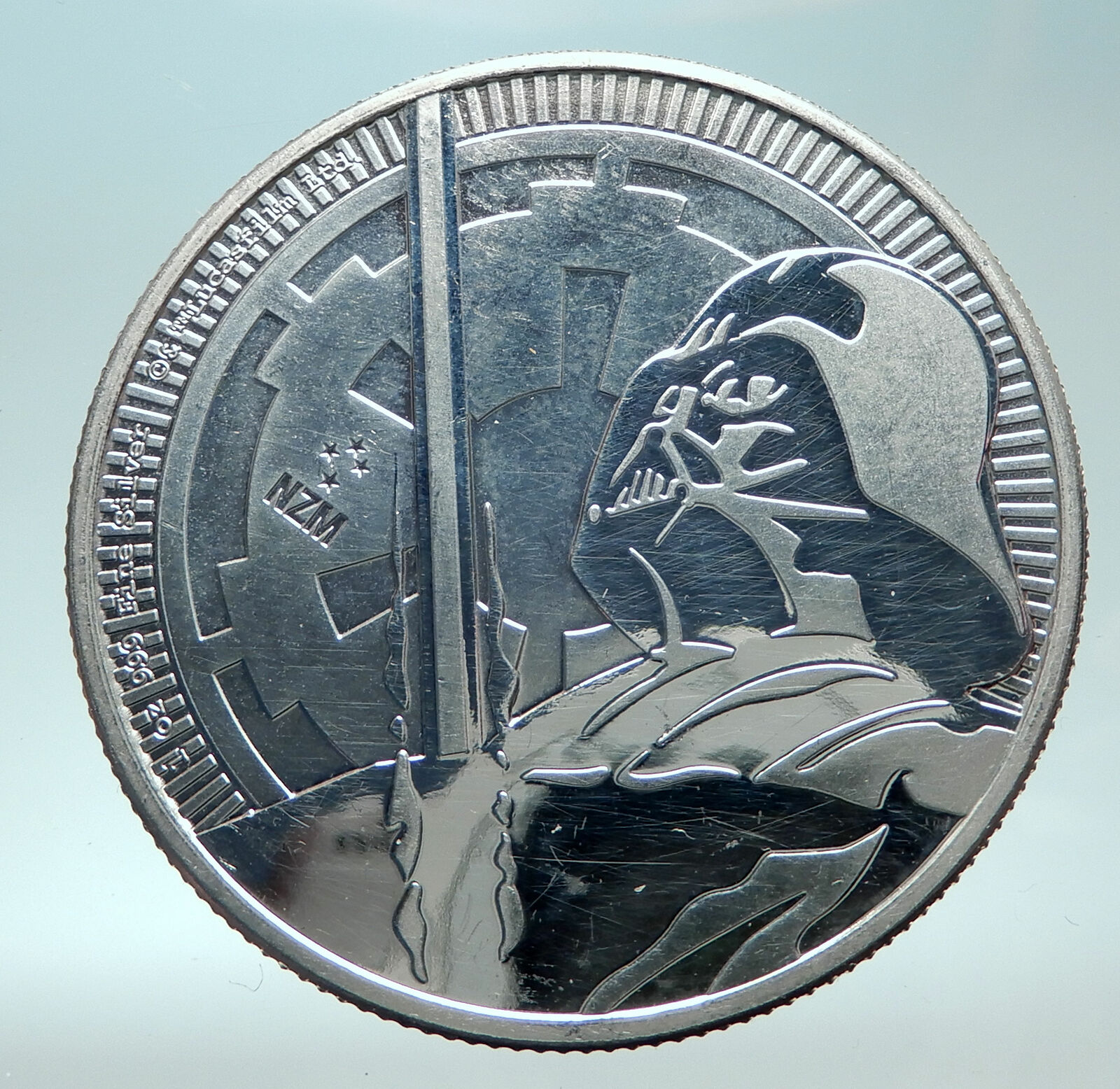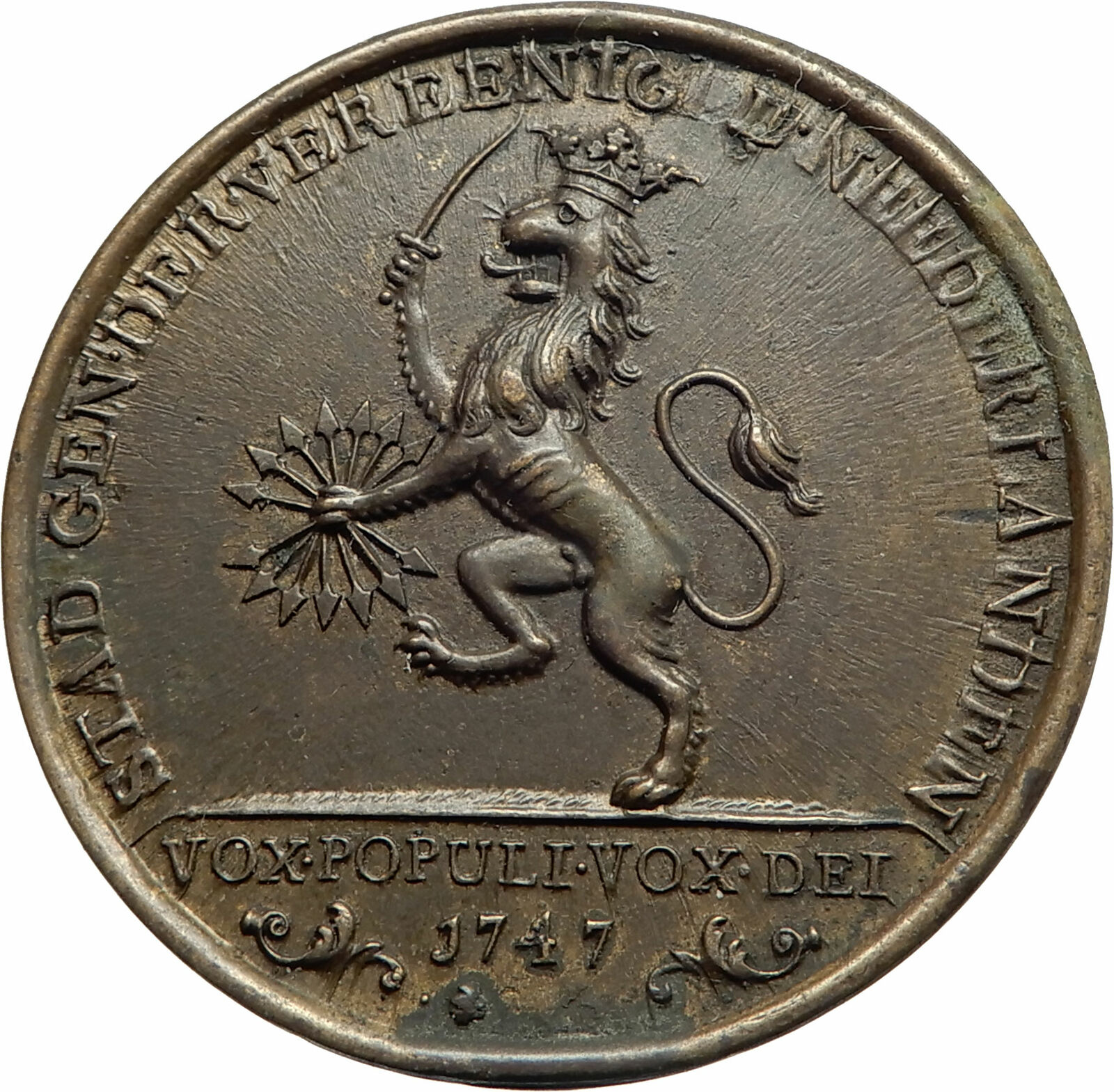|
Uruguay
First Electric Tram in Montevideo Inauguration
1906 Silver Medal 45mm (38.79 grams)
SOCIEDAD COMERCIAL DE MONTEVIDEO, Woman with branch and man with hammer watch electric tram enter city gates.
INAUGURACION DEL PRIMER TRAMVIA ELECTRICO EN MONTEVIDEO 1906 G. VERONESI, Plaque with wreath around.
You are bidding on the exact item pictured, provided with a Certificate of Authenticity and Lifetime Guarantee of Authenticity.
 Montevideo is the capital and largest city of Uruguay. According to the 2011 census, the city proper has a population of 1,319,108 (about one-third of the country’s total population) in an area of 201 square kilometers (78 sq mi). Montevideo is situated on the southern coast of the country, on the northeastern bank of the Río de la Plata. Montevideo is the capital and largest city of Uruguay. According to the 2011 census, the city proper has a population of 1,319,108 (about one-third of the country’s total population) in an area of 201 square kilometers (78 sq mi). Montevideo is situated on the southern coast of the country, on the northeastern bank of the Río de la Plata.
The city was established in 1724 by a Spanish soldier, Bruno Mauricio de Zabala, as a strategic move amidst the Spanish-Portuguese dispute over the platine region. It was also under brief British rule in 1807, but eventually the city was retaken by Spanish criollos. Montevideo is the seat of the administrative headquarters of Mercosur and ALADI, Latin America’s leading trade blocs, a position that entailed comparisons to the role of Brussels in Europe.
The 2019 Mercer’s report on quality of life, rated Montevideo first in Latin America, a rank the city has consistently held since 2005. As of 2010, Montevideo was the 19th largest city economy in the continent and 9th highest income earner among major cities. In 2022, it has a projected GDP of $53.9 billion, with a per capita of $30,148.
In 2018, it was classified as a beta global city ranking eighth in Latin America and 84th in the world. Montevideo hosted every match during the first FIFA World Cup, in 1930. Described as a “vibrant, eclectic place with a rich cultural life”, and “a thriving tech center and entrepreneurial culture”, Montevideo ranked eighth in Latin America on the 2013 MasterCard Global Destination Cities Index.
In 2014, it was also regarded as the fifth most gay-friendly metropolis in the world and the first in Latin America. It is the hub of commerce and higher education in Uruguay as well as its chief port. The city is also the financial hub of Uruguay and the cultural anchor of a metropolitan area with a population of around 2 million.
 Uruguay is a sovereign state in the southeastern region of South America. It borders Argentina to its west and Brazil to its north and east, with the Río de la Plata (River of Silver) to the south and the Atlantic Ocean to the southeast. Uruguay is home to an estimated 3.44 million people, of whom 1.8 million live in the metropolitan area of its capital and largest city, Montevideo. With an area of approximately 176,000 square kilometres (68,000 sq mi), Uruguay is geographically the second-smallest nation in South America, after Suriname. Uruguay is a sovereign state in the southeastern region of South America. It borders Argentina to its west and Brazil to its north and east, with the Río de la Plata (River of Silver) to the south and the Atlantic Ocean to the southeast. Uruguay is home to an estimated 3.44 million people, of whom 1.8 million live in the metropolitan area of its capital and largest city, Montevideo. With an area of approximately 176,000 square kilometres (68,000 sq mi), Uruguay is geographically the second-smallest nation in South America, after Suriname.

Uruguay was inhabited by the Charrúa people for approximately 4,000 years before the Portuguese established Colonia del Sacramento in 1680, meaning that Uruguay began to be colonized by Europeans relatively late compared with neighboring countries. Montevideo was founded as a military stronghold by the Spanish in the early 18th century, signifying the competing claims over the region. Uruguay won its independence between 1811 and 1828, following a four-way struggle between Spain, Portugal, and later Argentina and Brazil. It remained subject to foreign influence and intervention throughout the 19th century, with the military playing a recurring role in domestic politics until the late 20th century. The military seized power in a 1973 coup, installing a civic-military dictatorship; the military government persecuted leftists, socialists, and political opponents, resulting in several deaths and numerous instances of torture by the military; the military relinquished power to a civilian government in 1985. Modern Uruguay is a democratic constitutional republic, with a president who serves as both head of state and head of government.
.svg/220px-Uruguay_(orthographic_projection).svg.png) Uruguay is ranked first in Latin America in democracy, peace, low perception of corruption, e-government, and is first in South America when it comes to press freedom, size of the middle class and prosperity. On a per-capita basis, Uruguay contributes more troops to United Nations peacekeeping missions than any other country. It tops the rank of absence of terrorism, a unique position within South America. It ranks second in the region on economic freedom, income equality, per-capita income and inflows of FDI. Uruguay is the third-best country on the continent in terms of HDI, GDP growth, innovation and infrastructure. It is regarded as a high-income country (top group) by the UN. Uruguay was also ranked the third-best in the world in e-Participation in 2014. Uruguay is an important global exporter of combed wool, rice, soybeans, frozen beef, malt and milk. Nearly 95% of Uruguay’s electricity comes from renewable energy, mostly hydroelectric facilities and wind parks. Uruguay is a founding member of the United Nations, OAS, Mercosur, UNASUR and NAM. Uruguay is ranked first in Latin America in democracy, peace, low perception of corruption, e-government, and is first in South America when it comes to press freedom, size of the middle class and prosperity. On a per-capita basis, Uruguay contributes more troops to United Nations peacekeeping missions than any other country. It tops the rank of absence of terrorism, a unique position within South America. It ranks second in the region on economic freedom, income equality, per-capita income and inflows of FDI. Uruguay is the third-best country on the continent in terms of HDI, GDP growth, innovation and infrastructure. It is regarded as a high-income country (top group) by the UN. Uruguay was also ranked the third-best in the world in e-Participation in 2014. Uruguay is an important global exporter of combed wool, rice, soybeans, frozen beef, malt and milk. Nearly 95% of Uruguay’s electricity comes from renewable energy, mostly hydroelectric facilities and wind parks. Uruguay is a founding member of the United Nations, OAS, Mercosur, UNASUR and NAM.
The Economist named Uruguay “country of the year” in 2013, acknowledging the innovative policy of legalizing the production, sale and consumption of cannabis. Same-sex marriage and abortion are also legal, leading Uruguay to be regarded as one of the most liberal nations in the world, and one of the most socially developed, outstanding regionally, and ranking highly on global measures of personal rights, tolerance, and inclusion issues.
|





 Montevideo is the capital and largest city of Uruguay. According to the 2011 census, the city proper has a population of 1,319,108 (about one-third of the country’s total population) in an area of 201 square kilometers (78 sq mi). Montevideo is situated on the southern coast of the country, on the northeastern bank of the Río de la Plata.
Montevideo is the capital and largest city of Uruguay. According to the 2011 census, the city proper has a population of 1,319,108 (about one-third of the country’s total population) in an area of 201 square kilometers (78 sq mi). Montevideo is situated on the southern coast of the country, on the northeastern bank of the Río de la Plata. Uruguay is a sovereign state in the southeastern region of South America. It borders Argentina to its west and Brazil to its north and east, with the Río de la Plata (River of Silver) to the south and the Atlantic Ocean to the southeast. Uruguay is home to an estimated 3.44 million people, of whom 1.8 million live in the metropolitan area of its capital and largest city, Montevideo. With an area of approximately 176,000 square kilometres (68,000 sq mi), Uruguay is geographically the second-smallest nation in South America, after Suriname.
Uruguay is a sovereign state in the southeastern region of South America. It borders Argentina to its west and Brazil to its north and east, with the Río de la Plata (River of Silver) to the south and the Atlantic Ocean to the southeast. Uruguay is home to an estimated 3.44 million people, of whom 1.8 million live in the metropolitan area of its capital and largest city, Montevideo. With an area of approximately 176,000 square kilometres (68,000 sq mi), Uruguay is geographically the second-smallest nation in South America, after Suriname.
.svg/220px-Uruguay_(orthographic_projection).svg.png) Uruguay is ranked first in Latin America in democracy, peace, low perception of corruption, e-government, and is first in South America when it comes to press freedom, size of the middle class and prosperity. On a per-capita basis, Uruguay contributes more troops to United Nations peacekeeping missions than any other country. It tops the rank of absence of terrorism, a unique position within South America. It ranks second in the region on economic freedom, income equality, per-capita income and inflows of FDI. Uruguay is the third-best country on the continent in terms of HDI, GDP growth, innovation and infrastructure. It is regarded as a high-income country (top group) by the UN. Uruguay was also ranked the third-best in the world in e-Participation in 2014. Uruguay is an important global exporter of combed wool, rice, soybeans, frozen beef, malt and milk. Nearly 95% of Uruguay’s electricity comes from renewable energy, mostly hydroelectric facilities and wind parks. Uruguay is a founding member of the United Nations, OAS, Mercosur, UNASUR and NAM.
Uruguay is ranked first in Latin America in democracy, peace, low perception of corruption, e-government, and is first in South America when it comes to press freedom, size of the middle class and prosperity. On a per-capita basis, Uruguay contributes more troops to United Nations peacekeeping missions than any other country. It tops the rank of absence of terrorism, a unique position within South America. It ranks second in the region on economic freedom, income equality, per-capita income and inflows of FDI. Uruguay is the third-best country on the continent in terms of HDI, GDP growth, innovation and infrastructure. It is regarded as a high-income country (top group) by the UN. Uruguay was also ranked the third-best in the world in e-Participation in 2014. Uruguay is an important global exporter of combed wool, rice, soybeans, frozen beef, malt and milk. Nearly 95% of Uruguay’s electricity comes from renewable energy, mostly hydroelectric facilities and wind parks. Uruguay is a founding member of the United Nations, OAS, Mercosur, UNASUR and NAM.




